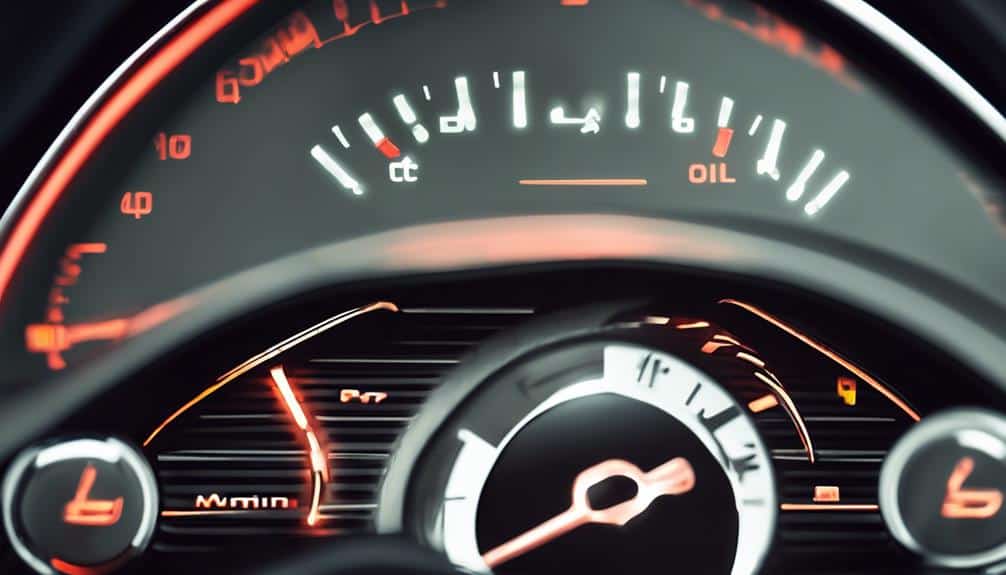If your Mini Cooper shows low oil pressure, it may signal issues like an improperly sealed oil filter, low oil level, or a faulty oil pump. This could lead to engine damage from increased friction and decreased performance. It's important to address this promptly to avoid further complications and costly repairs. Understanding the causes and implications of low oil pressure is essential for maintaining the health of your Mini Cooper's engine. Learn about the signs, consequences of neglect, and preventive measures to safeguard your vehicle's performance and longevity.
Common Causes of Low Oil Pressure
When diagnosing low oil pressure in a Mini Cooper, various common causes must be considered to pinpoint the issue accurately. One prevalent issue is an improperly sealed oil filter. If the new oil filter isn't sealed correctly during installation, it can lead to oil leakage and subsequently result in low oil pressure.
Another factor to examine is insufficient oil level. Low oil levels can cause a drop in oil pressure as there isn't enough oil to adequately lubricate the engine components.
Additionally, an oil filter that hasn't been fitted correctly, such as an incorrectly installed oil filter cap, can also contribute to low oil pressure problems. Hence, when troubleshooting low oil pressure in a Mini Cooper, it's essential to inspect the oil filter for proper installation and sealing to ensure optimal engine performance.
Impact of Low Oil Pressure
Low oil pressure in a Mini Cooper poses a critical risk to engine functionality due to the resulting inadequate lubrication. Insufficient lubrication caused by low oil pressure can lead to severe engine damage. When the engine lacks proper lubrication, friction between moving parts increases, potentially causing irreversible harm. Below is a table illustrating the potential impact of low oil pressure on a Mini Cooper's engine:
| Low Oil Pressure Effects | Description |
|---|---|
| Engine Damage | Friction between parts increases, leading to potential irreversible harm. |
| Inspection Required | Immediate inspection is vital to prevent further issues and assess damage. |
| Reduced Performance | Engine efficiency decreases as components wear faster due to inadequate lubrication. |
| Risk of Total Failure | Prolonged operation on low oil pressure can result in catastrophic engine failure. |
| Repair Costs Increase | Fixing engine damage due to low oil pressure can be costly, emphasizing the need for prompt action. |
When faced with low oil pressure in your Mini Cooper, swift action and thorough inspection are essential to mitigate the risk of extensive engine damage.
Signs and Symptoms to Watch For
To identify potential issues early, observe the following signs and symptoms indicative of low oil pressure in your Mini Cooper. One of the primary indicators of low oil pressure is the illumination of warning lights on your dashboard, specifically related to oil pressure.
Additionally, if you hear unusual engine knocking noises, it could signal insufficient lubrication due to low oil pressure. Keep an eye on your oil pressure gauge readings as a sudden drop could point towards this issue.
Poor engine performance, such as a lack of responsiveness or rough idling, may also suggest low oil pressure affecting engine functionality. Moreover, if you notice your Mini Cooper engine overheating frequently, it could be a consequence of inadequate lubrication caused by low oil pressure.
Promptly addressing these signs can help prevent potential engine damage and secure the longevity of your vehicle.
Consequences of Ignoring Low Oil Pressure
Continued disregard of low oil pressure in your Mini Cooper can result in harmful engine lubrication, escalating friction and heat generation within critical components. Ignoring this issue can have severe consequences for your vehicle:
- Accelerated Wear: Lack of proper lubrication due to low oil pressure can lead to increased friction between engine components, causing them to wear out more quickly.
- Engine Overheating: Insufficient oil circulation can result in higher temperatures within the engine, leading to overheating and potential damage.
- Reduced Engine Performance: Ignoring low oil pressure can hamper the overall performance of your Mini Cooper, affecting its efficiency and power output.
- Increased Risk of Engine Failure: Continuously running the engine with low oil pressure significantly raises the likelihood of catastrophic engine failure.
- Costly Repairs: Neglecting low oil pressure warnings can result in expensive repairs or even the need for a full engine replacement, impacting your finances significantly.
Addressing low oil pressure promptly is vital to avoid these detrimental outcomes and ensure the longevity of your Mini Cooper's engine.
Preventive Measures for Maintaining Oil Pressure
To sustain peak oil pressure in your MINI Cooper, routinely inspect the pressure gauge for any variations and handle them promptly.
Additionally, follow the manufacturer's suggested oil change intervals to guarantee proper lubrication and pressure levels.
These proactive measures can help you prevent potential low oil pressure issues and preserve the performance of your MINI Cooper.
Pressure Gauge Checks
Regularly monitoring the oil pressure gauge is a critical practice in maintaining ideal oil pressure levels in your Mini Cooper. To guarantee your vehicle's oil pressure remains at peak levels, consider the following preventive measures:
- Properly installing the oil filter with the spring-loaded core can help prevent low oil pressure issues.
- Following the manufacturer's recommended oil change intervals is essential for maintaining adequate oil pressure.
- Inspecting the oil pump for wear or damage can help sustain proper oil pressure levels in a Mini Cooper.
- Addressing any oil leaks promptly can avoid low oil pressure situations in a Mini Cooper.
- Periodically checking the oil pressure gauge for fluctuations can alert you to potential issues with engine parts and prevent damage.
Regular Oil Changes
Installing the oil filter with a spring-loaded core correctly is a vital step in maintaining ideal oil pressure levels in your Mini Cooper. Regularly checking the oil level and quality, and following the manufacturer's recommended oil change intervals are essential preventive measures. Neglecting these tasks can lead to low oil pressure issues.
Steps to Take When Experiencing Low Oil Pressure
When faced with low oil pressure in your Mini Cooper, the first step is to promptly evaluate the oil levels and quality. Here are some steps to take when experiencing low oil pressure:
- Check Oil Levels: Confirm the oil level is within the recommended range on the dipstick.
- Inspect Oil Quality: Examine for any signs of contamination or degradation in the oil.
- Examine Oil Filters: Dirty or clogged oil filters can contribute to low oil pressure.
- Listen for Engine Noises: Pay attention to any unusual knocking or ticking sounds, which may indicate low oil pressure.
- Monitor Warning Lights: Take note of any dashboard warnings related to oil pressure.
Taking these steps can help address low oil pressure issues promptly and prevent potential engine damage. If low oil pressure warnings persist, seek professional assistance to diagnose and resolve the underlying problems effectively.
Seeking Professional Help and Solutions
When facing low oil pressure issues in your Mini Cooper, consulting a certified MINI technician is essential for accurate diagnosis and repair.
Professional assistance can help pinpoint the root cause of warnings and estimate repair costs effectively.
Seeking expert solutions from MINI specialists guarantees the prevention of potential engine damage due to low oil pressure.
Mechanic Diagnosis Options
For precise identification of the root cause behind low oil pressure warnings in your Mini Cooper, seeking a mechanic's diagnosis is crucial. Mechanics have the expertise and tools necessary to analyze the issue effectively. Here are some mechanic diagnosis options to contemplate:
- Utilizing diagnostic tools to evaluate the oil pressure system thoroughly.
- Conducting a visual inspection for any visible leaks or damages.
- Checking the oil level and quality to guarantee proper lubrication.
- Inspecting the oil pump for functionality and potential issues.
- Testing the oil pressure sensor for accuracy in detecting low oil pressure conditions.
Repair Costs Estimation
Seeking professional assistance is essential when determining repair costs for addressing low oil pressure in your Mini Cooper. The cost of diagnosing low oil pressure in a Mini Cooper typically ranges from $100 to $200.
Repair expenses for resolving low oil pressure issues in a Mini Cooper can vary based on the specific underlying problem. If you need to replace a faulty oil pump in your Mini Cooper, you can expect to pay between $400 to $800.
Rectifying worn engine components contributing to low oil pressure may require repairs costing anywhere from $500 to $1500. It's important to consult a professional to accurately diagnose and resolve low oil pressure problems in your Mini Cooper to ensure top performance and longevity of your vehicle.
Conclusion
To sum up, when your Mini Cooper experiences low oil pressure, it's a red flag that shouldn't be overlooked. This issue could arise from various factors, resulting in serious consequences if not dealt with promptly.
Like a vigilant guardian, keep a close watch on your vehicle's oil pressure to guarantee smooth and effective operation on the road. Remember, prevention is crucial to preserving the health and longevity of your Mini Cooper.


